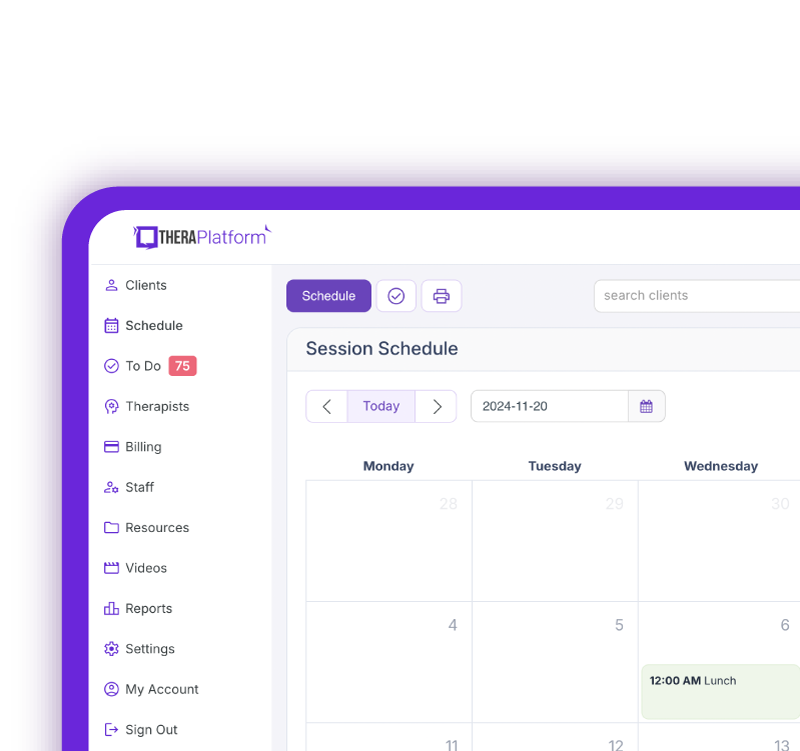AI in EHR

AI is becoming a supercharged secretary, as noted in a recent working paper co-authored by Stanford researchers. In therapy settings, it's helping time-strapped clinicians with scheduling, documentation, and even the often-dreaded task of data collection. This blog explores how AI, when integrated into EHRs like TheraPlatform, is revolutionizing client data collection and what that means for private practice therapists.
Summary
- AI in EHRs like TheraPlatform is streamlining client data collection by automatically extracting and storing information from driver’s licenses and insurance cards using OCR and NLP technology.
- Automated data entry boosts practice efficiency, billing accuracy, and client satisfaction, while also reducing errors that can lead to claim denials and administrative headaches.
- Beyond data collection, AI is enhancing other practice areas such as appointment scheduling and billing/code selection, freeing up therapists to focus more on client care.
- Therapists should still prioritize HIPAA compliance, client consent, and staff training to ensure responsible and secure use of AI tools within their practice.
Streamline your practice with One EHR
- Scheduling
- Flexible notes
- Template library
- Billing & payments
- Insurance claims
- Client portal
- Telehealth
- E-fax

See how AI in EHRs makes data collection easier and how this innovative process benefits therapists in private practice.
How AI works in data collection in EHRs
Collecting client data is a time-consuming but necessary aspect of owning a private therapy practice. It typically involves therapists manually entering client information, but manual entry is prone to errors, potentially resulting in claims rejections down the road.
EHRs like TheraPlatform, however, are using AI therapy technology that can make client data collection easier.
Through innovative optical character recognition (OCR) and Natural Language Processing (NLP), only found on TheraPlatform, you can now automatically extract information from client documents like driver's licenses and insurance cards.
Your clients must upload pictures of their driver's licenses and health insurance cards (at the therapists' request). TheraPlatform will extract data from the cards and automatically and securely save it under the client's chart.
Practice Management + EHR + Telehealth
Manage more in less time in your practice with TheraPlatform

Benefits of using an EHR with AI for data collection
While driver's licenses and insurance cards may seem like minor details in a months-long therapy cycle, information from these documents can significantly impact many aspects of the business.
Let's look at some benefits of using AI in an EHR for proper data collection.
- Better efficiency: Using AI as a part of data collection can lower therapists' time on manual entry and data management. Tasks that took several minutes to complete (like entering insurance card and driver's license information) now take seconds and are an extremely low-touch process for the therapists. This newfound efficiency could translate into more time spent with clients in sessions and potentially more revenue.
- Compliance and regulation: Proper client data maintenance is essential for complying with regulatory and legal requirements. Proper record-keeping and adhering to private standards demonstrate ethical responsibility.
- Superior data accuracy: Thorough documentation is the cornerstone of effective therapy and billing. Correctly gathering accurate information upfront streamlines the entire insurance submission process and keeps therapists out of the submission-denial-appeal loop.
Watch this video to discover 3 smart ways AI can speed up your note-taking
→ Start My Free Trial - Save Hours on Notes Starting Today
- Proper identification: Correct, legible information on a driver's license ensures therapists are working with the correct client and data. Poor data collection processes could result in potential confusion over names, addresses, or other personal information.
- Consistent record-keeping: Through NLP, data extracted from images can be predictably populated on forms and automatically and securely stored in the relevant areas of the EHR, making accessibility and management a breeze each time.
- Scalability and growth: As a therapist's private practice grows, so does the data volume. Automated processes can help therapists scale easily and accommodate larger caseloads without sacrificing quality.
- Improved client experience: Automated data collection, especially upfront in the therapeutic alliance, could catalyze an enhanced or improved experience for a client in therapy. Staying current on new technology reflects a therapist's professionalism, which could instill confidence in some clients. Additionally, hassle-free billing contributes to client satisfaction and the overall therapy experience. (Ever had to ask for a client's insurance card more than once?)
- Timely reimbursement: Therapists frequently bill insurance companies for their services, and having the most accurate driver's license and insurance data ensures claims are processed without issue. Getting paid promptly is critical to maintaining the financial stability of a private therapy practice.
While AI-powered data collection delivers clear benefits, it's just one piece of a bigger puzzle. EHRs now incorporate AI in more private practice areas, offering additional tools to help therapists save time and improve operations.
Free Resources for Therapists
Click below and help yourself to peer-created resources:

Other uses for AI therapy in EHRs
In addition to using text-to-image data collection to process information from driver's licenses and insurance cards, AI is being integrated into EHRs in other ways, including:
- AI-powered appointment scheduling: Therapy scheduling is a game nobody likes, but fortunately, AI therapy technology is developing to alleviate some of the back-and-forth scheduling that goes into a simple session appointment. Some AI scheduling tools can manage recurring events, reschedule based on conflicts, and even write emails to clients based on availability.
- Billing and coding automation: Raise your hand if you like billing and coding work. That's what we thought. Crickets. The good news is that some AI can analyze records, identify the correct codes, and assign those codes automatically, taking some of the pain away from the billing process.
As promising as these AI applications seem, clinicians must consider legal, ethical, and operational factors. Responsible AI use in therapy demands attention to privacy, consent, and staff training, especially when client data is involved.
Streamline your practice with One EHR
- Scheduling
- Flexible notes
- Template library
- Billing & payments
- Insurance claims
- Client portal
- Telehealth
- E-fax

Tips when using an AI in EHR
While AI therapy technology offers numerous benefits and opportunities for therapists to enhance care and their practice, it's essential to be mindful of potential concerns.
- Data privacy and security: While data extraction and storage are essential, therapists must legally comply with HIPAA regulations. For that reason, therapists must store data in a secure environment. TheraPlatform uses bank-level encryption to protect valuable client data so therapists can have peace of mind.
- Client engagement and consent: In the spirit of transparency, providers should inform clients about how AI is used in their care. Simple statements or requests can help clients engage with the process to understand how AI is being incorporated into the administrative and therapeutic methods.
- Staff training: Properly training team members on how to best use EHRs with AI to streamline private practice administrative tasks can help offset and prevent any possible issues.
By keeping these considerations in mind, therapists can confidently adopt AI-powered tools while maintaining compliance and trust. Ultimately, AI isn't just about automation—it's about freeing therapists to do what they do best: providing meaningful care.
Correct data collection can remove the frustration of managing a private therapy practice. Having great data upfront ensures therapists can avoid administrative mishaps, leaving them more time to focus on their expertise of helping clients and providing excellent care.
Streamline your practice with One EHR
- Scheduling
- Flexible notes
- Template library
- Billing & payments
- Insurance claims
- Client portal
- Telehealth
- E-fax

Resources
TheraPlatform is an all-in-one EHR, practice management, and teletherapy software built for therapists to help them save time on admin tasks. It offers a 30-day risk-free trial with no credit card required and supports mental and behavioral health, SLPs, OTs, and PTs in group and solo practices.
More resources
- Therapy resources and worksheets
- Therapy private practice courses
- Ultimate teletherapy ebook
- The Ultimate Insurance Billing Guide for Therapists
- The Ultimate Guide to Starting a Private Therapy Practice
Free video classes
- Free mini video lessons to enhance your private practice
- 9 Admin tasks to automate in your private practice
FAQs about AI in EHR
How does AI help with client data collection in therapy practices?
AI tools in EHRs like TheraPlatform use OCR and NLP technology to automatically extract and populate information from documents such as driver’s licenses and insurance cards, eliminating manual data entry and reducing errors.
What are the benefits of using AI-powered data collection?
Automated data entry improves efficiency, billing accuracy, HIPAA-compliant record-keeping, client experience, and reimbursement timelines while supporting scalability for growing practices.
What should therapists consider when using AI in their EHR?
Therapists should prioritize HIPAA compliance, obtain client consent, and ensure proper staff training to responsibly and securely implement AI tools in their practice.



